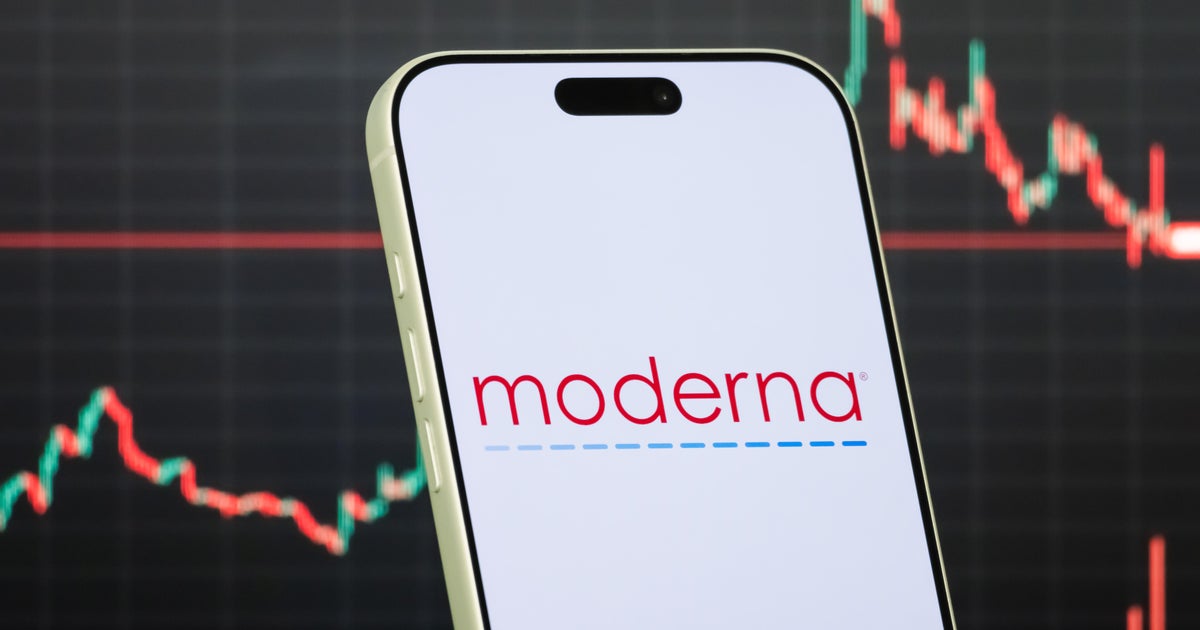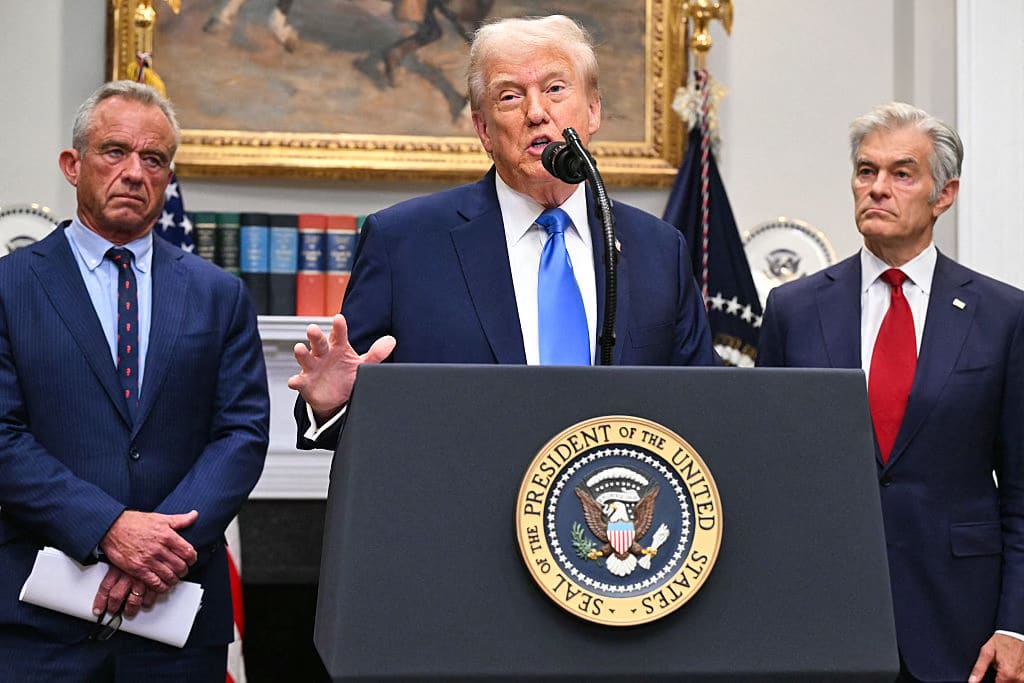Transcript: Alex Azar discusses coronavirus on "Face the Nation," May 17, 2020
The following is a transcript of an interview with Health and Human Services Secretary Alex Azar that aired Sunday, May 17, 2020, on "Face the Nation."
MARGARET BRENNAN: Elizabeth Palmer in London. Thank you. We want to go now to Health and Human Services Secretary Alex Azar. He joins us from HHS. Good morning, Mr. Secretary.
HEALTH AND HUMAN SERVICES SECRETARY ALEX AZAR: Good morning, Margaret. Good to be with you again.
MARGARET BRENNAN: Great to have you. Operation Warp Speed, which is what the White House is calling this push to have a vaccine by the end of the year, 300 million doses, is the promise. Can you be clear here is the pledge that all 328 million Americans will be able to get a shot in their arm by the end of the year?
SEC. AZAR: Well, Margaret, let's be clear. That's a goal. And you know, I- I think the Gretzky's once said that you fail to achieve 100 percent of the goals you don't set. And so it's not a pledge. It's a goal of what we're going to mobilize the entire U.S. government, private sector to achieve. What happened is, you know, these drug companies and vaccine makers, they all said it's going to take this amount of time because they're using their traditional approaches. You- you do phase one, phase two, phase three trials in sequence. Then you do manufacturing. Well, the president said that's not acceptable. So what we're doing is wringing the inefficiency out of the development process to make the development side faster to get to safe and effective vaccines. And at the same time, we're gonna scale up commercial-sized manufacturing--
MARGARET BRENNAN: Right.
SEC. AZAR: --and produce hundreds of millions of doses at risk. They may not pan out. They might not prove to be safe and effective. But we'll have it so we could begin administration right away.
MARGARET BRENNAN: You said hundreds of millions of doses. That is not the same thing as saying hundreds of millions of vaccines ready to be administered to the American public. You said this week that the entire American population could receive vaccines by January. That's the goal. Can you--
SEC. AZAR: That's a--
MARGARET BRENNAN: Can you clarify--
SEC. AZAR: That's it-- hundred- hundreds of millions. We have hundreds of millions of people. So 300 million is the goal and by January that we would set, whether by one or multiple vaccine candidates to be able to have. Let's- let's focus our energies--
MARGARET BRENNAN: So is this- is this--
SEC. AZAR: --on actually getting those vaccines developed at this point.
MARGARET BRENNAN: Absolutely. I just want to set expectations for the American people, because clearly you're going to have a lot of people wanting this vaccine. Will it require booster shots? Are you sure 2, 300 million doses is sufficient?
SEC. AZAR: Well, those are great questions, Margaret. That's actually going to be part of the development programs that you study. Is do- is it a single shot? Do you have a multiple with a booster or what type of immune response do you get your- that's why you don't go into battle with just one target here. So we had a hundred candidates originally. We've narrowed it to 14. And we're going to keep narrowing that down to maybe four or five, six, that we really place the big financial bets behind and drive on. And we might actually have multiple vaccines, some appropriate for different populations and different settings as we- as we see the data get generated here.
MARGARET BRENNAN: President Trump said on Monday, we have prevailed. On that same day, May 11th, all 12 of the different models that the CDC uses projected that there will be over 100,000 deaths by June 1st. How can the administration say we've prevailed when you see a death rate climbing like that?
SEC. AZAR: Well, Margaret, as- as you'll remember, the president clarified that in response to a question that by prevailed, he meant with regard to testing, by building a really novel, comprehensive private public sector diagnostic system here in the United States. He did not mean the disease burden here. And he actually, I think, clarified that you could never speak of prevailing or- or success when there's even a single death. Every death is tragic. The disease burden here is- here and across the world has been- has been horrible. We've worked to minimize that. We believe that our actions to delay and- and- and flatten the curve, saved hundreds of thousands of lives that otherwise could have been lost but- but that's still nothing to revel in in terms of any loss of life is tragic for the president or for any of us in the public health world. Absolutely.
MARGARET BRENNAN: But given that some of the states are starting to reopen parts of their economy and there's a lag time of sometimes two to three weeks before you see the virus show up, how- how much of a sense do you have about whether reopening is reinfecting the populace at large?
SEC. AZAR: Well, these will be really important questions, Margaret, for us to study through our comprehensive surveillance system. So that's why a critical part of reopening has been influenza-like illness surveillance and other hospital admission surveillance, as well as syndromic testing of asymptomatic individuals, especially in high-risk communities. And that's actually what's going to be really helpful with this federal system and the approach the president's taking of having each state taking a localized decision. It's going to give us really good data. You know, Georgia--
MARGARET BRENNAN: So we don't know what risk of reopening, in other words, just yet but you are going to be monitoring it is what you're saying.
SEC. AZAR: We certainly- we certainly will be monitoring. But we've seen some initial instances of states like Georgia that have reopened, Florida that's reopening, that we have not seen. But again, it's still early days. We think the tools are there. And it's also important to remember, you know, this gets set up as a health versus economy kind of conflict.
MARGARET BRENNAN: Right.
SEC. AZAR: It's actually health versus health. We see- we see suicidality. We see reduction in cardiac procedures, cancer screenings, pediatric vaccinations. There is a real- a very real health consequence to these shutdowns that must be balanced against as we- as we try to reopen this economy and move forward.
MARGARET BRENNAN: Absolutely. Whistleblower Dr. Rick Bright is going to appear on "60 Minutes" tonight. He specifically names you in his complaint as having downplayed the catastrophic threat. The last time that you were with us here on FACE THE NATION was March 1st. And at that time, you told me, "what your viewers need to know is the risk to the average Americans remain low." Do you stand by that? I mean, do you take responsibility for any missteps you might have--
SEC. AZAR: So--
MARGARET BRENNAN:-- taken?
SEC. AZAR: So, MARGARET, I think if we found the entire clip, because I was using words only that Dr. Fauci, Dr. Redfield. Dr. Schuchat, Dr. Messonnier would tell me to say and would repeat publicly. Also, I believe what I said is the risk to the average American at this time remains low. But that could change rapidly. We always were- I was always focused on warning that the situation could change, that at the moment the risk was low to any individual American.
MARGARET BRENNAN: Right.
SEC. AZAR: So I stand by that in the sense that that's what the public health people were- I don't make this stuff up. I go with what Fauci and Redfield and Schuchat and Messonnier and others say, because they're the public health experts.
MARGARET BRENNAN: Certain- certainly. But they report up to you. The CDC has been blamed for failure and mistakes with testing. Do you take responsibility for that?
SEC. AZAR: So we were confronting a situation here that's completely novel. There has never been a national, immediate testing regime across public and private sectors. We have had to literally build this from the ground up, Margaret. That's what some folks don't quite understand here, is that the CDC's role is to develop an initial, fairly low throughput public health test that health labs will- will do for initial diagnosis. But then we count on the private sector actually to scale up these high throughput, large test capacities. And that's what we've done in historic time. You know, these tests normally would take--
MARGARET BRENNAN: So- so you don't--
SEC. AZAR: --six to nine months to get.
MARGARET BRENNAN: --take responsibility for any problems that the CDC has admitted to having had?
SEC. AZAR: We, you know, what did the- what problem did the CDC have? The CDC had an issue as they scaled up manufacturing of tests to get them out to about 90 public health labs.
There was apparently a contamination at an end stage there on the third part of the reagent that never led to false negatives or false positives, but that prevented some of the scale up for a couple of weeks. But that was never going to be the backbone of testing, of broad mass testing in the United States, Margaret. That depends on the companies like Abbott and Roche and Thermo Fisher--
MARGARET BRENNAN: Well your- your colleague--
SEC. AZAR: --for these high throughput tests.
MARGARET BRENNAN: I just want to clarify because your colleague, Peter Navarro, has said that the CDC let the country down.
SEC. AZAR: Well--
MARGARET BRENNAN: Given the CDC reports up to you, --
SEC. AZAR: I--
MARGARET BRENNAN: Do you take responsibility for that? What do you think about that?
SEC. AZAR: I don't believe the CDC let this country down. I believe the CDC serves an important public health role. And what was always critical was to get the private sector to the table.
MARGARET BRENNAN: All right. Mr. Secretary, thank you for your time.
SEC. AZAR: Thank you, Margaret.
MARGARET BRENNAN: FACE THE NATION will be right back with the Speaker of the House, Nancy Pelosi. Stay with us.
A portion of this interview was cut for time. Here is the transcription of that exchange:
MARGARET BRENNAN: You're a father. You have a high school and college age kid. Do you feel confident sending them back to school in the fall? Will you do that?
SEC. AZAR: I will feel confident. And here's the reason, because we're following a very measured plan, which is comprehensive testing across the country. So first we do surveillance for influenza-like illness and hospital admissions to look for any early indicators. Anybody who's symptomatic needs to be tested. We have the capacity and capability for that. We do asymptomatic syndromic testing to see if we have undiscovered illness in core populations of congregate living, schools, senior care, prisons, meat packing facilities. We then surgeon with containment approaches. We now with testing have an average of nine percent positivity in the United States and what the public health experts say is you're doing adequate testing if you're at 10 percent or below.
MARGARET BRENNAN: So you are confident--
SEC. AZAR: --and so we're driving towards that.
MARGARET BRENNAN: -- in of the guidance that you have provided to schools at this point and you can tell American parents they should be confident sending their kids back.
SEC. AZAR: Well, it'll depend on the ground situation in any locality. That's the key to this, Margaret.
MARGARET BRENNAN: OK.
SEC. AZAR: The circumstances in Des Moines, Margaret, may be different than the circumstances in New York City,--
MARGARET BRENNAN: Understood.
SEC. AZAR: --and that's why we defer to locally led, state managed and federally supported efforts here.



